- Home
- Elif Shafak
The Architect's Apprentice Page 9
The Architect's Apprentice Read online
Page 9
It was Olev the lion-tamer who came to his aid. He explained to Jahan that an order, once pronounced, must be followed. In whatever time was left they had to train the elephant.
If the beast was afraid of tigers, they would have to teach him to overcome his fear. With this purpose, Olev found a tiger skin, God knew from where. Then he asked Sangram to bring a sheep. An innocent animal with blank, brown eyes. They let it graze during the day and kept it in the stable at night. Meanwhile, Olev handed a firkin to one of the kitchen boys, instructing him to fill it with blood the next time a chicken was slaughtered.
The following morning, when Chota was out in the yard, Olev asked the same boy to put on the tiger’s skin: it was draped round the lad’s shoulders, its edges tied around his neck. Olev then instructed him to crawl on all fours around the elephant, growling and snarling.
‘Knock down the bucket!’
While the boy did as told, the elephant watched this peculiar creature out of the corner of his eye. That day they did not give him food and there was no water. They sharpened his tusks and kept him chained. The second day Olev stuffed the tiger skin with spuds and placed it near Chota’s cage. Again there was no food, no treats, just a tad of water. He did not allow him to go out for a walk either. Upset and irked, the elephant kept glancing at the tiger skin, holding it responsible for his misery.
The third day Olev brought over the sheep and wrapped the tiger skin on its back. The poor animal tried to shake the thing off, but Olev had smeared the insides with a sticky pine resin. He dragged the sheep in this state into Chota’s barn. An hour later the elephant was allowed in. By this time Chota was fraught with hunger and thirst, the sheep crazy with fear. Olev took out the filled firkin. He poured the blood over the sheep: its tiger skin and wool got soaked in red. The smell of blood was sharp, sickening. Olev covered the sheep’s head with a cloth. No longer able to see anything the animal went wild. Its tension infected Chota, who began to stamp his feet. In its daze the sheep ran left and right, eventually ramming into the elephant. Chota swung his trunk, hitting the sheep with tremendous force. The animal toppled over, then recovered, unleashing awful sounds that would haunt Jahan for weeks to come.
Trembling, Jahan closed the gate on them. He waited, his ear to the door, holding the handle so hard his fingers ached. He heard the sheep’s endless bleating – a bloodcurdling wail as if from the bottom of hell. Little by little, all sounds withered away. Gently, they opened the door. It reeked of blood, urine and excrement. There lay the sheep, lifeless, half mutilated.
That night in the menagerie, Jahan sat with the other tamers around a fire scented with cedar wood. They talked in hushed tones, the smoke from their waterpipes swirling in the air. The Chinese twins, wrapped in a hashish daze, kept chuckling at things unseen.
The moon hovered large and low over Istanbul. The sky resembled a sieve of countless holes through which starlight seeped on to the sleeping city. Where there had once been excitement, there was now weariness in Jahan’s soul. What was he doing in this garden amid wild animals, apart from his kith and kin? His sisters must be married by now, perhaps had babies each. The thought of them sitting around another fire – one that was so far away it could not warm him – filled his heart with despair. He should be going back home. Instead he was going to war.
Friday afternoon, following the prayer, the Sultan gave the command for the sounding of the war drum, a giant circular instrument moulded from bronze that was struck seven times before every campaign. The spine-tingling noise rumbled through the marble halls, the rose gardens and the animals’ cages, vibrated through the neighbourhoods of rich and poor alike.
In front of Jahan’s eyes the entire city made ready to do battle. Every mother’s son was a soldier of sorts. The Janissaries came out of their barracks. The pashas saddled up their horses. The artisans and the shopkeepers took up arms, as did the gardeners, bakers, cooks, tailors, farriers, furriers, cobblers, potters, weavers, riggers, tanners, chandlers, glaziers, sawyers, stonemasons, coppersmiths, carpenters, tinkers, rope-makers, rat-catchers, caulkers, fletchers, oarsmen, fishmongers, poulterers and even the soothsayers. In each guild there was a flurry of activity, including in that of the prostitutes.
Even so, everyone waited for the Chief Royal Astronomer to announce an auspicious day to launch the war. There was a right time for everything – celebrations, weddings, circumcisions, warfare. Finally, after nights of watching the stars, the date was fixed. At the end of twenty sunsets the troops would be on their way.
Since war meant finding your enemy, unless the enemy found you first, they had to traverse the distance between the Golden Horn and the River Pruth. The elephant and the boy were ordered to march in the front lines. This perturbed Jahan greatly. He did not wish to be that close to the delibashlar – the crazyheads. Clad in furs, tattooed from head to toe, ears pierced, scalps shaved, they were erratic, rough and savage. Among them were vicious criminals. Playing trumpets, blowing horns, banging drums of all sizes and hollering as if to wake the dead, they made a terrible racket certain to chill the enemy’s blood – and put an elephant into a frenzy.
Jahan mulled over how best to reveal his concerns, but as it turned out there was no need. The morning they set off for Black Bogdania, the mad clamour sent Chota into a rage so fierce that he nearly trampled a soldier. Before dusk the two of them were moved towards the back rows alongside the cavalry. This time, however, it was the horses that got skittish. In the end they had to be relocated again, next to the corps of footmen.
After that things went smoothly. Chota broke into a springy trot, enjoying the open air and the steady march after months of being confined to the palace gardens. From where he sat up on his neck, Jahan could see below and behind, astonished to find himself staring at a sea of bodies with no end in sight. He saw the camels carrying provisions and the oxen pulling cannons and catapults; the Halberdiers of the Tresses, with their hair dangling from their caps; the dervishes chanting invocations; the agha of the Janissaries proudly sitting atop his stallion; the Sultan riding an Arab steed, encircled by guards on both sides – the left-handed archers to his left, the right-handed to his right. In front of him rode a standard-bearer carrying his flag of seven black horsetails.
Propping up their banners and horsetails-on-poles; hoisting lances, scimitars, hatchets, arquebuses, axes, javelins, bucklers, bows and arrows, thousands of mortals were forging ahead. Jahan had never seen so many together. The army was less a horde of men than one lump of giant. The beat of feet and hooves in tandem was hair-raising and stupefying at once. They proceeded uphill against the wind, slicing through the landscape like knife into flesh.
Every now and then Jahan jumped off the elephant, deciding to walk for a while. This is how he met a foot-soldier, lively as a grig-hen, his waterskin slung across his back.
‘When you finish off an enemy, it settles in your gait,’ the soldier said. ‘For every dastard’s head you get a mansion in heaven.’
Not knowing much about Paradise or why he would need houses there, Jahan remained quiet. The foot-soldier had fought in the Battle of Mohacs. Droves of infidels had died – falling to the earth like a slew of felled birds. The ground had been strewn with corpses still holding on to their swords.
‘It was raining all the time … but I saw a golden light,’ he said, dropping his voice to a whisper.
‘What d’you mean?’ asked Jahan.
‘I swear. It was so bright. It shone upon the field. Allah was on our side.’
All at once, his words were pierced by a sharp cry of pain. Soldiers ran left and right, barking orders. Murmurs rippled from row to row. Where once was solid ground there was now a large hollow, like an empty eye socket turned towards the skies. The earth had opened up its mouth and swallowed a party of cavalrymen. They had tumbled into a pit with sharpened stakes deep inside – a well-concealed trap left by the enemy. They had died instantly. Only a sable horse was still breathing, gored in the neck, when an archer
shot it to end its suffering.
A debate ensued as to whether to take the dead out and bury them or leave them where they were. The light was already receding from the horizon. Time being precious, they were laid to rest together, horses and soldiers sharing the same grave. How unfair, Jahan thought, that only the humans would go to heaven, having attained martyrdom, while the animals that accompanied them and died for them were turned away from the gates of Paradise. It was a thought he didn’t know what to do with and kept to himself.
In the days ahead, the army ploughed through pearly valleys and rugged hills, making headway with the sun, camping with the dark. In this manner, after six dawns and five dusks, they reached the banks of the River Pruth. A curtain of fog rolled over the water. There was nothing to convey them to the other shore: no boats, no bridge. They were ordered to set up their tents and get a good rest while a solution was sought.
Bolting towards a bend in the river that had silted up with sludge, Chota threw himself into the pool, wallowing, squelching, trumpeting. Such was his delight that entire regiments stopped to watch him.
‘What is he doing?’ said the foot-soldier.
‘Covering himself with dirt.’
‘Why would he do that?’
‘They can’t sweat like us,’ said Jahan. ‘Water keeps them cool. The mud protects them from the sun. Taras taught me.’
‘Who is Taras?’
‘Uhm … This old tamer in the palace,’ said Jahan nonchalantly. ‘He knows everything about every animal.’
The foot-soldier studied him with a glint in his eyes. ‘So you learned about the elephant’s ways from this Taras. Why didn’t you know about your own beast?’
Jahan evaded his gaze, suddenly uneasy. He had said too much. Every time he allowed someone, anyone, to prise open the shell of his soul he repented of it instantly.
Soon it became obvious that Chota was the only one benefiting from the hiatus. Endlessly waiting by the river didn’t go down well with the Janissaries, who longed for victory and loot. The wind that had lashed at their faces during the march had abated, but now there were swarms of mosquitoes everywhere. They stung with a vengeance, as if they had been trained by the enemy. The soldiers were tense, the horses fidgety. The foragers were tired of raking through the same villages for food and the soup tasted blander by the day.
In the meantime, a corps of workers had begun building a bridge. They seemed to be doing a fine job, when, unexpectedly shoved by Sheitan, first one then the rest of the piers collapsed. Before the week was over, the foundations of a second bridge had been laid; though thicker and sturdier than the first, its abutment crumbled even faster, wounding half a dozen soldiers and killing one. The third bridge was only a weak attempt. The soil was too boggy, the river’s current relentless. Disheartened and bone-weary, they fell into a torpor that sucked them down like the marsh beneath their feet. Jahan didn’t even need to ask the foot-soldier what he thought about their predicament: he knew he would say that the Almighty, who had brought them all the way into this bleak landscape, had suddenly forgotten them. If things went on like this, before the war had even started, the Ottoman Army would be defeated by its own impatience.
The Master
By the River Pruth they waited. The water ran wild and deep between the Ottoman Army and the enemy. The Janissaries itched to be on the other shore, athirst for victory.
One morning, Jahan saw the zemberekcibasi* hurrying as fast as his legs would carry him, coming in his direction. Eager to learn what was going on, he was late in moving out of the man’s way.
‘How is the beast doing, mahout?’ asked the zemberekcibasi, quickly righting himself after their minor collision.
‘He is very well, effendi, ready to fight.’
‘Soon, insha’Allah. First we need to cross this cursed river.’
And with those words the man disappeared into a hefty tent that had two soldiers outside standing sentinel. Jahan should have stopped there, but he didn’t. Not pausing to think whose tent this could be, he walked with such steadiness that the guards took him to be the attendant of the zemberekcibasi and let him pass.
Inside, it was so crowded nobody paid the boy any attention. Quiet as a mouse, Jahan tiptoed to a corner opposite the door, squeezing in between two pages. Cloth walls, brocade cushions, carpets of dazzling colours; salvers piled high with delicacies; braziers, lanterns, incenses with sweet fragrances. He wondered if he could filch a few things for Captain Gareth but even the thought of that was terrifying.
The Grand Vizier was there, a heron’s plume attached to his turban. The Sultan was at the far end, clad in an amber kaftan, dignified as a sculpture. He sat on a bejewelled throne set upon risers, a position that allowed him to study. The Shayh al-Islam, the Janissary agha and the other viziers had lined up on either side of him, offering comments. They were discussing whether or not to alter their route, in order to find a bend in the river where the ground would be hard enough to build a bridge. This not only meant losing weeks, perhaps as much as a month, but also the favourable weather.
‘My gracious Lord,’ Lutfi Pasha said. ‘There’s someone who can build us a strong bridge.’
When the Sultan demanded who that might be, Lutfi Pasha said, ‘One of your elite guards. Sinan is his name, your Haseki* slave.’
Before long a man was ushered in. He kneeled down, merely steps away from where Jahan stood. He had a wide forehead, chiselled nose and dark, sombre eyes that exuded calmness. Asked to come forward, he proceeded slowly, lowering his head, as if against a gusty wind. After listening to why he had been summoned, Sinan said, ‘My felicitous Sultan, we shall have a bridge, Allah willing.’
‘How many days, by your reckoning, would be needed to complete it?’ asked Sultan Suleiman.
Sinan paused, though not for long. ‘Ten, my Lord.’
‘What makes you think you will succeed when others have failed?’
‘My Lord, the others, with pure intentions no doubt, began the construction straight away. I shall build the bridge in my mind. Only after that will I have it set in stone.’
Strange though the answer was, it seemed to please the Sultan. Sinan was given the task. He went back the way he had come, unhurried. As he passed Jahan, he took a look at the boy’s face and then did something Jahan had not seen any man of his rank do before. He smiled.
It was then that a thought occurred to the boy. If he worked with this man, he could get close to Sultan Suleiman’s riches. Everyone said the sovereign had brought chests full of coins and jewels to distribute to those who demonstrated great courage on the battlefield.
‘Effendi, wait,’ Jahan yelled once he had sneaked out, catching up with the architect. ‘I am the elephant’s tamer.’
‘I know who you are,’ said Sinan. ‘I have seen you take care of the beast.’
‘Chota is stronger than forty soldiers. He could be of great help to you.’
‘Well, do you know anything about construction?’
‘We … we worked with a master mason in Hindustan.’
Holding the boy’s eyes in his stare, Sinan gave this some thought. ‘What were you doing in the Grand Vizier’s tent?’
‘I slipped in on the sly,’ said Jahan, this time telling the truth.
The lines around Sinan’s eyes softened. ‘An elephant could prove useful. A bright, inquisitive boy like yourself might help, too.’
Jahan felt his cheeks burn. In all his time in the world he could not recall anyone having called him bright. And, just like that, the elephant and the mahout joined the army of stonemasons and began working with this stranger called Sinan.
Keen as the labourers were to put their backs into the work, the first day went by without anyone moving a finger. So did the second. Sinan seemed to be dawdling: walking back and forth along the river, staring into the distance, poking canes into the water, taking measurements, carrying scrolls of paper, scribbling numbers, drawing shapes no less obscure than those on an oracle’s charts.
The soldiers were starting to get nervous, asking what on earth they were waiting for. At nights in the tents and around the fires, rumour had it that Sinan was clearly not the right man for the task.
On the third day Sinan announced they would start construction. To everyone’s surprise he had chosen a site two donum* up the shoreline, where the river was wider. When asked why he was taking them that far, he said a bridge could be short or long, that didn’t matter, but its foundations had to be as strong as granite.
Chota carried wooden frames and planks; he moved rocks into place so as to protect the structure from the force of the current. That he could plod in the river easily proved to be opportune. In the fast-flowing water that reached up to their chins he was a great asset. They used massive, watertight barrels, each of which had been sealed inside with clay mortar and lowered into a newly dug hole. Covered in mud, sweat and dirt, Jahan toiled alongside the labourers. Strange men they were. Tough and taciturn, but yet caring towards one of their own. They would put their right hand on their heart whenever they heard someone mention the prophets Seth and Abraham, the Patron Saints of Stonemasons and Architects. Among them, Jahan felt more at ease than he ever had anywhere. Like them, he found a secret joy in raising stone upon stone. Ten days after Sinan had been entrusted with the job, they finished the bridge.
Seated on his horse, the Sultan was the first to cross, holding the reins tightly in one hand. The Grand Vizier followed, then the others, including Lutfi Pasha, who congratulated himself on having found the architect. Once the royal entourage reached the opposite bank, everyone rejoiced. The whole army began to traverse the bridge, six men at a time. Here and there prayers were heard – men unafraid of bloodshed but terrified of water. When it was their turn, Jahan and Chota made a move, but they were stopped by the Subashi.
‘The beast ought to wait. He’s too heavy.’

 Black Milk: On Writing, Motherhood, and the Harem Within
Black Milk: On Writing, Motherhood, and the Harem Within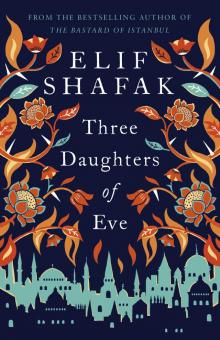 Three Daughters of Eve
Three Daughters of Eve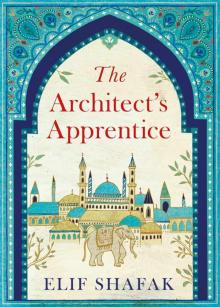 The Architect's Apprentice
The Architect's Apprentice The Gaze
The Gaze The Flea Palace
The Flea Palace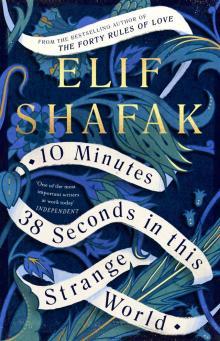 10 Minutes 38 Seconds in this Strange World
10 Minutes 38 Seconds in this Strange World The Forty Rules of Love
The Forty Rules of Love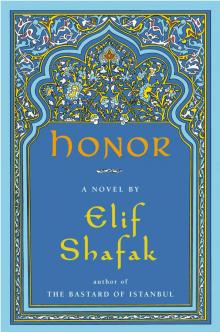 Honor
Honor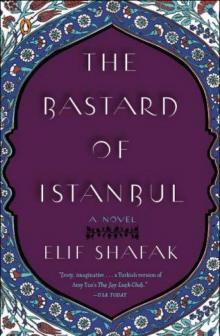 The Bastard of Istanbul
The Bastard of Istanbul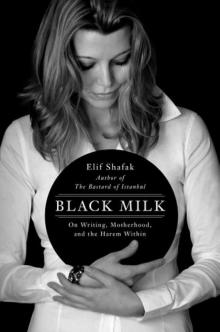 Black Milk
Black Milk The Happiness of Blond People (Penguin Specials)
The Happiness of Blond People (Penguin Specials)